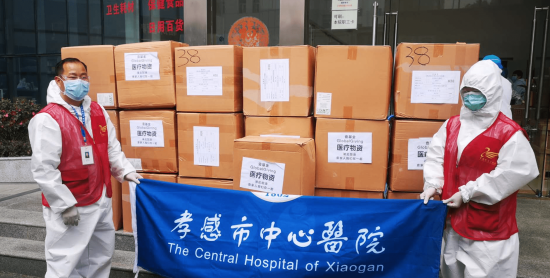During the fight against Covid-19, philanthropy in China demonstrated how it was capable of providing swift and effective responses that were highly sensitive to the requirements of communities most in need, write 2019 AsiaGlobal Fellow Rui Wang of the crowdfunding platform GlobalGiving and Minne Deng of the United Nations Development Programme in China. As the Chinese economy emerges from the pandemic, the sector can build on those achievements and become an important driver in the nation’s efforts to achieve the UN Sustainable Development Goals.
Hard times in Kunming: While China has made progress in eradicating extreme poverty and working towards the Sustainable Development Goals, Covid-19 has been a major setback (Credit: Pong Ketkeawmangkon / Shutterstock.com)
Five years have passed since the launch of the High-level Political Forum on Sustainable Development, the United Nations platform for monitoring the 2030 Agenda for Sustainable Development. While there has been major progress towards the Sustainable Development Goals (SDGs), the biggest global public-health crisis in over a century has been an enormous setback, requiring reflection and a reset of social policies in every country.
China, the first nation to tackle the coronavirus and one of the first to emerge from the pandemic and return to growth, is no exception. As the country continues its efforts to achieve the SDGs, its experience dealing with the pandemic revealed how philanthropy is indispensable in this mission, regardless of what governments at all levels are doing. The sector has played a significant role in building partnerships, strengthening collaboration among stakeholders, providing new financing opportunities, and facilitating social innovation.
Contributing to achieving the SDGs
Philanthropy’s contribution to the drive to achieve the SDGs in China extends across social, economic and environmental issues, an analysis of the work of Chinese philanthropic organizations shows. Since 2015, there has been steady growth in the number of foundations and projects and in the amount of SDG-related expenditure. Overall allocations rose from 30 billion renminbi (US$429 million) in 2015 to 58 billion renminbi (US$831 million) in 2018, an increase of 94 percent (Figure 1). Foundations are at the forefront of contributions aimed at facilitating the 2030 Agenda through grants, operations and the spurring of social investment.
Of the three thematic areas of the SDGs – social, economic and environmental – philanthropic investment in the social arena, especially relating to human-security priorities including poverty alleviation (SDG1), good health and wellbeing (SDG3), quality education (SDG4), and sustainable cities and communities (SDG11), have increased markedly over the past five years (Figure 2). China announced in November that it had succeeded in meeting its goal of eradicating extreme poverty in the country by 2020.
Another feature of Chinese philanthropy’s SDG engagement is its mobilization of resources from more developed regions, such as coastal areas, to the less developed central and western parts of the country, helping to some extent alleviate existing regional inequality. While the coastal regions possess more abundant philanthropic resources such as foundations (Figure 3), less developed regions have been the major destination of philanthropic expenditure. Moreover, foundations in several western and central provinces recorded drastic increases in project funding.
The analysis of philanthropy indicates that efforts to achieve environment-related SDGs are largely lagging, a revelation perhaps for the country’s sustainable development campaign (Figure 4). Consider contributions towards affordable and clean energy (SDG7), responsible consumption and production (SDG12), climate action (SDG13), life below water (SDG14), and life on land (SDG15).
Philanthropy in the fight against Covid-19
This year, the role of philanthropy in the fight against Covid-19 in China highlighted the sector’s focus on social challenges. As the crisis evolved, so did the work of the sector. At the early stage, the response concentrated on procurement and distribution of personal protective equipment (PPE), as well as organizing and managing volunteers in communities. These two types of primary work by organizations such as the One Foundation provided frontline support in a timely manner, particularly in the epicenter of the outbreak in Wuhan and Hubei Province. These groups typically had gained expertise from previous post-disaster mitigation experience. As more philanthropic organizations such as the Zhuoming Disaster Information Center and the China National Committee for Disaster Reduction (CNCDR) joined the battle against the coronavirus, they played a significant role in collecting, analyzing and sharing reliable information to facilitate transparent, efficient and effective collaboration beyond the philanthropic sector.
After the pandemic was contained in China, philanthropists shifted their focus to long-term recovery. Efforts were put into tackling the economic crisis caused by Covid-19 by supporting individuals, small and medium-sized enterprises, as well as the smaller NGOs. Online tools were used for continuous fundraising to sustain on-the-ground projects. Some organizations undertook advocacy and public education on health issues and data privacy. All these have contributed to enabling an environment for a quick recovery in social and economic terms.
In addition, Chinese philanthropists and foundations have tapped into international aid programs by making numerous overseas donations of PPE, sharing Covid-19-related information and toolkits with international peers, and exploring opportunities for cross-border collaboration.
Beyond the recovery
Uncertainty about the post-Covid-19 economy is likely to result in a decrease in donations and expenditures unequally distributed across focus areas and regions. Opportunities remain not just in traditional development work but in cutting-edge areas such as financial and digital transformation.
Digital technology is essential for driving greater transparency and improving the ability to assess projects, measure impact and share evaluations. This would facilitate collaboration between public and private philanthropic players and across sectors. In addition, tech-enabled infrastructure and tools would make it possible for targeted crowdfunding and crowdsourcing to mobilize more resources to address SDG gaps.
Recent policy measures have proven to be a crucial catalyst for philanthropic engagement in certain fields. China’s recently drafted 14th Five-Year Plan (for 2021 to 2025) emphasizes good health and wellbeing (SDG3) in response to the obvious need for increased attention to public health in the post-pandemic era. Increased focus on affordable and clean energy (SDG7), reducing inequalities (SDG10) and sustainable cities and communities (SDG11) is in line with the national green-economy drive. Not only would major funding be directed towards these areas, the implementation of relevant policies will also unleash the potential for effective action of other actors in the Chinese philanthropic sector such as the Charity Federation System, which represents one third of total donations in China. There are also incentives for Chinese NGOs to contribute to development work abroad.
Covid-19 has triggered a great economic and social transformation – and the philanthropic sector has certainly been affected. The coronavirus disrupted daily routines and changed social patterns possibly forever. In general, an acceleration in innovation and collaboration by China’s philanthropic sector will help to narrow and even eliminate the country’s SDG gaps. In China and elsewhere, international development agencies and foundations need to continue facilitating the integration of the SDGs into their philanthropic activity, and they should re-examine the shifts in these fundamental socio-economic, political and cultural challenges, especially those heightened by the calamitous pandemic.
All figures are from the UNDP report “Philanthropy for Sustainable Development in China 2020”.
Further reading:
Rui Wang
2019 AsiaGlobal Fellow, Asia Global Institute, The University of Hong Kong
Minne Deng
United Nations Development Programme
Check out here for more research and analysis from Asian perspectives.



